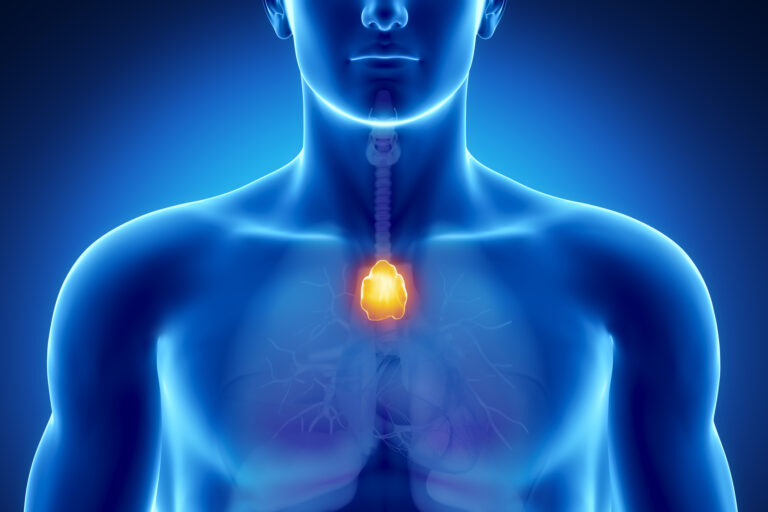
胸腺切除术(即切除胸腺)是针对患有胸腺瘤(胸腺癌)的重症肌无力患者的推荐手术。该手术也用于改善以下情况引起的肌肉无力: 重症肌无力.
与专家交谈
关于共付额援助约有 10% 的重症肌无力患者患有胸腺瘤,这是一种在胸腺上发展的罕见良性癌症,而胸腺切除术则可以切除胸腺癌或胸腺瘤。
胸腺切除术联合药物治疗是改善重症肌无力患者肌无力症状并切除良性肿瘤的有效方法。本文将探讨胸腺切除术治疗重症肌无力的适应症、禁忌症、益处、副作用、风险及其他相关主题。
什么是胸腺切除术?为什么要进行胸腺切除术?
胸腺是一个小腺体,是免疫系统的一部分,负责免疫细胞的发育和成熟。它位于胸部前上方。
胸腺在整个儿童时期都会发育,成年后停止生长并变小。然而,重症肌无力患者的胸腺相对较大。
在某些重症肌无力患者中,胸腺上会发生良性癌症,导致肌肉无力,需要进行胸腺切除术以切除胸腺。
胸腺切除术适用于以下患者:
- 60 岁以下,因重症肌无力导致中度至重度虚弱
- 患有胸腺瘤或胸腺癌
- 患有良性胸腺囊肿的人, 恶性胸腺癌以及神经内分泌肿瘤(这些是胸腺切除术的一些不太常见的适应症)
胸腺切除术的禁忌症
对于以下患者,不建议进行胸腺切除术:
- 无法忍受全身麻醉等手术并发症的患者,或存在血凝块形成受损或血压和血流不稳定风险的患者
- 患有胸腺瘤但年龄较高的患者
- 眼部重症肌无力患者,该病导致的无力症状仅限于眼部肌肉
什么是重症肌无力?
我们的神经负责以神经递质(化学物质)的形式向肌肉发送和传输信号,进而触发肌肉运动。
重症肌无力 (MG) 是一种神经肌肉自身免疫性疾病,其中抗体会破坏神经和肌肉之间的信号和通讯,导致肌肉无力。
在重症肌无力中,身体的随意肌,例如控制嘴、眼、喉咙和四肢运动的肌肉,通常会受到影响,导致这些肌肉无力和疲劳。
胸腺切除术治疗重症肌无力
胸腺在整个儿童时期的免疫系统发育中起着重要作用,因为它产生 T细胞,一种有助于抵抗和预防感染的白细胞。
如前所述,胸腺在青春期停止生长并逐渐缩小,直至被脂肪取代。然而,重症肌无力患者的胸腺即使在成年期仍然保持相对较大。
此外,免疫细胞簇可能在胸腺中积聚,并发展成胸腺瘤。胸腺瘤虽然无害,但有可能癌变。切除胸腺有助于改善肌肉无力症状。
胸腺瘤与重症肌无力之间的确切关系尚不完全清楚,但人们认为它们之间存在自身免疫联系,因为重症肌无力也是一种自身免疫性疾病。胸腺异常可能在自身免疫性疾病(包括重症肌无力)的发生发展中发挥作用。
获得财务援助
重症肌无力胸腺切除术治疗重症肌无力的益处
胸腺切除术治疗重症肌无力有多种益处,包括:
- 肌肉无力和疲劳明显改善
- 减少重症肌无力药物的使用
- 理想情况下,疾病永久缓解
- 切除肿瘤
- 减轻症状、提高肌肉力量,有助于提高重症肌无力患者的整体生活质量
然而,重症肌无力患者接受胸腺切除术的疗效及转归,因人而异,因此,患者应在咨询医护人员后,再决定是否接受胸腺切除术。
胸腺切除术的副作用
如果由经验丰富的外科医生对合适的患者实施,胸腺切除术被认为是一种安全有效的手术。然而,该手术仍然存在一些潜在的风险和并发症。
胸腺切除术的一些常见副作用或并发症可能包括:
- 心脏、神经或血管附近的损伤
- 出血
- 恶心或呕吐
- 肺炎
- 淋巴液在肺和心脏之间积聚
- 心房颤动 或心律不齐













